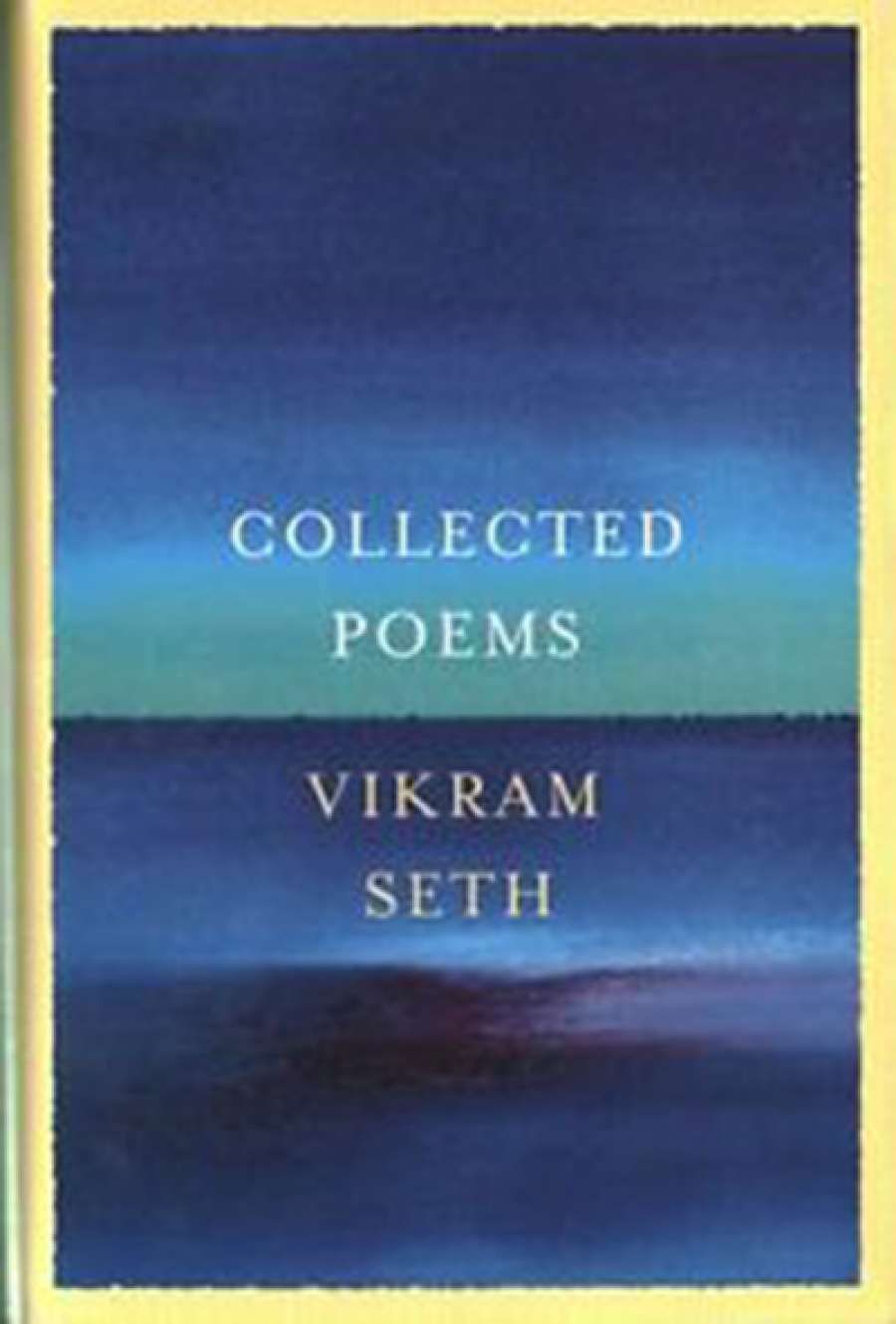
- Free Article: No
- Contents Category: Poetry
- Custom Article Title: Stephen Edgar reviews 'Collected Poems' by Vikram Seth
- Review Article: Yes
- Online Only: No
- Custom Highlight Text:
In one of the poems in Summer Requiem, the most recent of the books in this capacious volume, Seth recalls when he decided to write, 'What even today puzzles me ...
- Book 1 Title: Collected Poems
- Book 1 Biblio: Weidenfield & Nicolson $59.99 hb, 695 pp, 9780297608783
Seth anticipates criticism of these poems in his introduction, describing them as 'embarrassingly callow'. Even among these pieces, though, signatures of his work are to be found: descriptions and evocations of the natural world, often infused with the emotion of some relationship, a loved one present, or absent; his characteristic clear, tight stanza forms.
And there is a translation of Du Fu. The Chinese connection is a constant throughout Seth's poetry and accounts for some of his most appealing and memorable poems. The opening section of his second book, The Humble Administrator's Garden (1985), has a Chinese setting and some of the pieces might almost be translations from the Chinese ('Three moons – of water, mirror, sky – define / Pine and old cypress struggling against the stars'). His technical assurance is much more in evidence in this book and indeed, since it was published in 1985, he must have been working on The Golden Gate, if not simultaneously then very soon afterwards. The poems have a satisfying concert of mood, matter, and image, and often lift, by the simplest of means, what might seem in danger of being a spare and literal-minded description into something moving:
Evening is the best time for wheat.
Toads croak.
Children ride buffaloes home for supper. The last loads are shoulder-borne.
Squares light up
And the wheat sags with a late gold.
There on the other side of the raised path Is the untransplanted emerald rice.
But it is the wheat I watch, the still dark gold
With maybe a pig that has strayed from the brigade
Enjoying a few soft ears.
('Evening Wheat')
Other sections deal with India and California (also an obsession). Binding them is a recurrent thread of separation in love. The mistakes, slippages, failures of omission and commission that complicate human relations ('Though hand in hand / We did not speak') also feature largely in his third book, All You Who Sleep Tonight (1990). I wonder whether Seth is an admirer of Housman's poetry. A pervasive sadness, though not so plangent, matched with verse forms of lapidary simplicity suggests an affinity:
Above all to my heart I'm true.
It does not tell me what to do.
It beats, I live, it beats again.
For what? I wish I knew it knew.
('Heart')
In a quite different vein is the stomach-turning 'Work and Freedom', written in the voice of an Auschwitz officer ('In Auschwitz truly / I had no reason to complain of boredom') and 'A Doctor's journal entry for August 6, 1945', describing the Hiroshima bombing. Seth can be amusing too:
God loves us all, I'm pleased to say –
Or those who love him anyway –
Or those who love him and are good.
Or so they say. Or so he should.
('God's Love')
I have no space to do more than name Three Chinese Poets (1992), his translations from Wang Wei, Li Bai, and Du Fu, and to say again that Seth's sensibility chimes very much with theirs. I particularly admire the Wang Wei.
 Vikram SethI mentioned that this is a capacious volume. Possibly too capacious. The children's verses in Beastly Tales (1991) ('On the Ganga's greenest isle / Lived Kuroop the crocodile') seem out of place. And libretti are not normally thought of as literary works in their own right, a judgement that Arion and the Dolphin does not overturn. The song cycles, however, mostly work well as poems.
Vikram SethI mentioned that this is a capacious volume. Possibly too capacious. The children's verses in Beastly Tales (1991) ('On the Ganga's greenest isle / Lived Kuroop the crocodile') seem out of place. And libretti are not normally thought of as literary works in their own right, a judgement that Arion and the Dolphin does not overturn. The song cycles, however, mostly work well as poems.
The last and most recent collection is Summer Requiem (2012), which resembles its predecessors in subject matter and technique, with perhaps an even more intense focus on beauty and transience ('The moon will die / Earth, evening, you and I. / There are no fixtures in the sky / Free from the growing past'), though it also includes the hilarious 'Rocking-Horse'. On the continuum of poetry from mindful clarity to Rimbaud's derangement of the senses, Seth never strays far from the former. He is not a poet of verbal pyrotechnics, of the Dionysian and dithyrambic. His language is marked by tact and restraint, by fine observation finely expressed, by intelligent empathy. His always light touch tends now to the witty and satirical, now to the poignant and elegiac, at times achieving an amalgam of the two, 'that sad and happy thing'.
Introducing Mappings, Seth says that he 'did not realize that writing in rhyme and metre would make me a sort of literary untouchable'. To some, I dare say. But as he aptly observes elsewhere: 'The joy of poetry for me lies not so much in transcending or escaping from the so-called bonds of artifice or constraint as in using them to enhance the power of what is being said.'


Comments powered by CComment